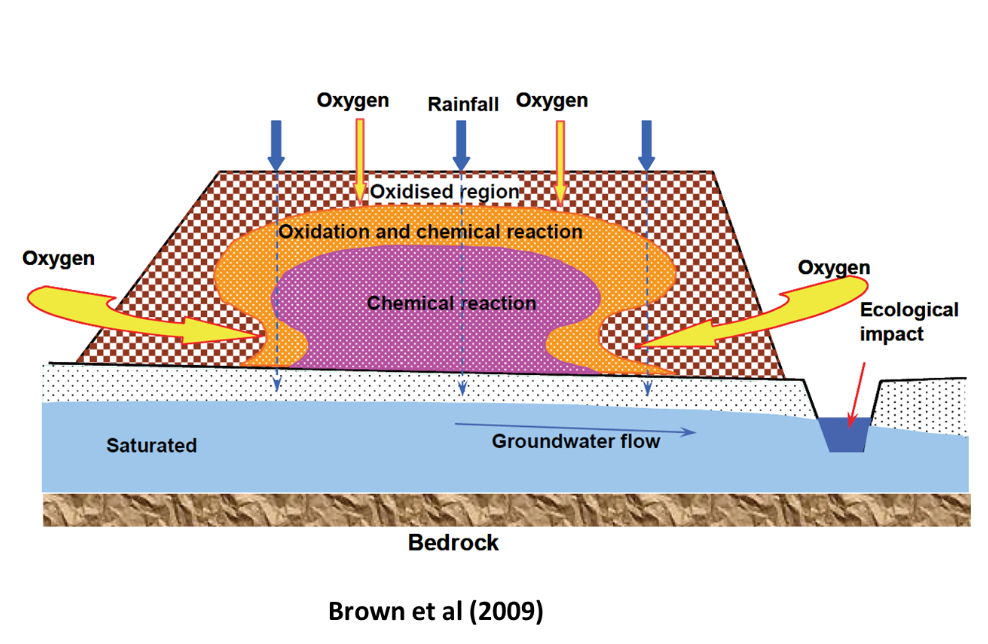Acid and metalliferous drainage (AMD) occurs when sulfide-containing rocks react with oxygen in air and water to form sulfuric acid. This becomes a larger issue when the acid leaches heavy metals and salts out of the rock, which can potentially affect the environment for centuries after mine closure.
 Today more than any other time practical solutions for prediction, prevention and control of acid, neutral, and saline drainage are needed by the mining industry in Australia and elsewhere. A leading edge practice spans the life cycle of mining projects, from exploration to closure and beyond, but also adapts to the longer and dynamic cycles of the resources industry, as well as climate change. Under pressure from commodity markets, some mines may go under ‘care and maintenance’ and some may approach closure. Therefore, innovative approaches to understanding and controlling residual risk is paramount. While, minimising risk and costs is the obvious goal, the real cost is not getting it right.
Today more than any other time practical solutions for prediction, prevention and control of acid, neutral, and saline drainage are needed by the mining industry in Australia and elsewhere. A leading edge practice spans the life cycle of mining projects, from exploration to closure and beyond, but also adapts to the longer and dynamic cycles of the resources industry, as well as climate change. Under pressure from commodity markets, some mines may go under ‘care and maintenance’ and some may approach closure. Therefore, innovative approaches to understanding and controlling residual risk is paramount. While, minimising risk and costs is the obvious goal, the real cost is not getting it right.
The challenges of Acid and Metalliferous Drainage (AMD) have been demonstrated in multiple sites across Australia, and over the years, a strong stakeholder network has developed to develop and promote best practice in AMD prevention. The Sustainable Minerals Institute acts as the local partner of the International Network for Acid Prevention (INAP), convening a biennial AMD Workshop at regional locations around the country. These events have been well attended by representatives from industry, government and academic institutions, providing an opportunity for sharing knowledge and identifying opportunities for research and application.
The experience gathered in mining commodities of all types, across a vast range of climatic conditions, has provided Australia with critical capability in all aspects of managing water in mineral operations. The Australian AMD network promotes collaboration amongst partners in research and communication on this important topic, and engages with regional neighbours and networks such as Indonesia and Papua New Guinea. SMI’s International Centre of Excellence in Chile has recently taken the role of co-ordinating the Latin American node of INAP, further extending the reach and influence of network activities.

 Today more than any other time practical solutions for prediction, prevention and control of acid, neutral, and saline drainage are needed by the mining industry in Australia and elsewhere. A leading edge practice spans the life cycle of mining projects, from exploration to closure and beyond, but also adapts to the longer and dynamic cycles of the resources industry, as well as climate change. Under pressure from commodity markets, some mines may go under ‘care and maintenance’ and some may approach closure. Therefore, innovative approaches to understanding and controlling residual risk is paramount. While, minimising risk and costs is the obvious goal, the real cost is not getting it right.
Today more than any other time practical solutions for prediction, prevention and control of acid, neutral, and saline drainage are needed by the mining industry in Australia and elsewhere. A leading edge practice spans the life cycle of mining projects, from exploration to closure and beyond, but also adapts to the longer and dynamic cycles of the resources industry, as well as climate change. Under pressure from commodity markets, some mines may go under ‘care and maintenance’ and some may approach closure. Therefore, innovative approaches to understanding and controlling residual risk is paramount. While, minimising risk and costs is the obvious goal, the real cost is not getting it right.